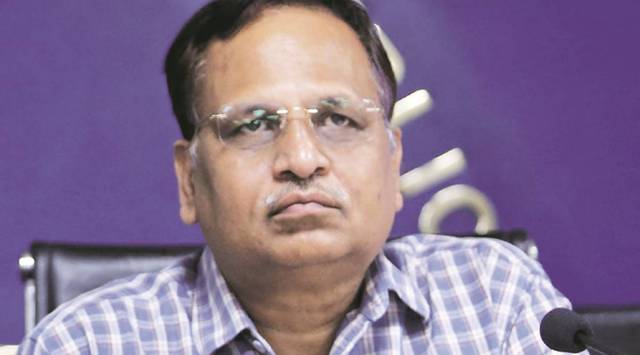‘My fault is I became a minister, else there would be no case’: AAP’s Satyendar Jain wraps up bail arguments
Senior advocate N Hariharan, who appeared for Jain, argued before Special Judge Vikas Dhull at Rouse Avenue court. The judge will hear the Enforcement Directorate’s arguments to the bail plea on November 5.
 AAP leader Satyendar Jain.
AAP leader Satyendar Jain. AAP minister Satyendar Jain Friday wrapped up his bail arguments before a Delhi court in connection with an alleged money laundering case against him, by submitting that his only fault was that he “became a minister and got into public life”, otherwise “there would be no case”.
Senior advocate N Hariharan, who appeared for Jain, argued before Special Judge Vikas Dhull at Rouse Avenue court. The judge will hear the Enforcement Directorate’s arguments to the bail plea on November 5.
Hariharan began his arguments by submitting that Jain’s first bail application was dismissed since the matter was at the stage of investigation and the complaint was not yet filed. However, he said, “this no longer stands for the bail to be dismissed”. He also apprised the court of the previous bail order which did not designate Jain as a flight risk or a risk to witnesses since their statements have already been recorded.
“Element of a fair trial is coterminous with grant of bail. I am in prolonged incarceration, and it will not serve any purpose. Right of a fair trial gets affected with prolonged incarceration,” Hariharan told the court.
He further told the court that his client was “neither a director nor a shareholder” in any of the companies under investigation. “There are four companies. Entire case is based on two wrong assumptions. It is based on notional value to shares. No offence can be on notional value. These values are subject to change,” Hariharan told the court.
He argued that this notional value was also attributed wrongly. “My (Jain’s) fault is I became a minister and got into public life,” Hariharan submitted.
Hariharan told the court that the ED’s evidence “was lacking” to show that Jain was in possession of these shares. “It is not their case that I (Jain) or Poonam (Jain’s wife) sold these shares. The shareholding remained the same. There was no transaction as far as these shares are concerned. How are they coming to these figures? They come to this through notional value… this cannot be done in the eyes of law,” Hariharan argued.
The senior counsel submitted that Jain was granted bail in the disproportionate assets case investigated by the CBI and that he joined the investigation on a number of occasions and “despite all this, 5 years down the line, they (ED) chose to arrest him”.
Hariharan argued that Jain was a minority shareholder and questioned whether such a shareholder could control the companies under investigation. “As a minority shareholder, could he have exercised any control over these companies? What is the role of a shareholder? In fact has only made investment. What is he entitled in return? Dividend if there is profit. Was I a director in these companies? 2014-17, I was nowhere in the company. Entire problem is if I had not joined politics, there would be no case. Public servant is the important cog therefore the check period gains importance,” Hariharan told the court.
Hariharan argued that the “entire argument is fallacious” that Jain exercised control over the company. He told the court that Jain at the time was an architect by profession who was offering consultancy services to the co-accused persons, rendering advice on which agricultural land was suitable for purchase.
Hariharan also informed the court about the statement made by co-accused Vaibhav Jain, who said that the “entire money belonged to Satyendar Jain” but later retracted this statement, which was not even videographed, and had informed the court through an application that this statement was given after the ED threatened him.







